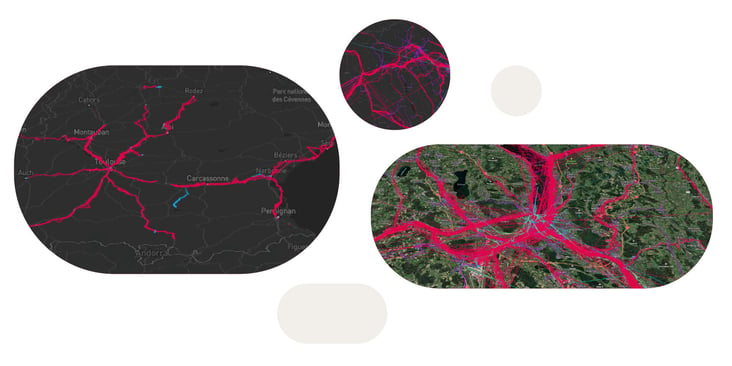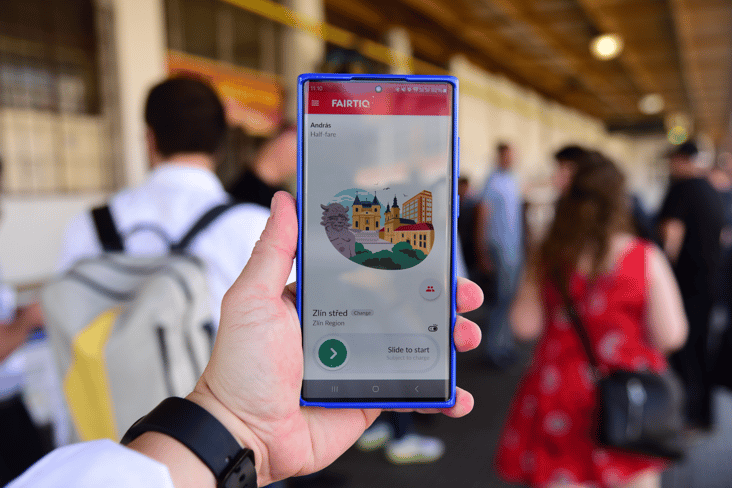
Transparent pricing and simple ticketing solutions are two key ways to attract more people to public transport. But what does 'transparent' mean? What do passengers make of electronic tickets? Can a new type of fare model actually increase demand? With the FTQ Lab App, public transport associations and providers can trial digital fares and FAIRTIQ's easy-to-use check-in/check-out technology under real-life conditions.
A little extra feature
The FTQ Lab app is exactly the same as the FAIRTIQ app, except for one tiny, but important difference: the FTQ Lap app can limit the number of users. This makes the app the ideal test bench. The FTQ Lab app and the regular FAIRTIQ app can run simultaneously without any problem, which means that FAIRTIQ partners can also trial new fare models. To have an idea of the possibilities that the FTQ Lab app offers, you need look no further than two pilot projects currently under way in Halle (Saale) and Berlin.
German city of Halle puts new distance-based fare to the test
The Hallesche Verkehrs-AG (HAVAG) operates a total of 14 tram and 22 bus routes which cover the city of Halle and surrounding areas like Merseberg. Travellers within the 210 fare zone have been able to use the FAIRTIQ app for their journeys since November 2019. However, HAVAG did not have a special electronic fare – or eFare for short – until now.
In September 2022, HAVAG, with the help of the FTQ Lab app, began trialling a distance-based fare across the 210 fare zone. The fare is calculated according to the shortest distance from the starting point to the destination. The flat fare is 1.50 euros, with an additional 15 cents for each kilometre travelled. A daily fare cap means that users pay no more than 6.60 euros, i.e. the price of a 24-hour travel pass.
HAVAG hopes that the new eFare will attract users who rarely take public transport or tend to travel only short distances. For the duration of the pilot, different scenarios will be used to test and evaluate the distance-based fare. New and existing FAIRTIQ app users can register to take part in the project.
Network-wide digitalisation ahead
In the first month of testing, almost 550 HAVAG passengers registered with the FTQ Lab app. Ultimately, as many as 2,000 test users are expected to sign up. Close to 160 test users are currently using both the FTQ Lab app and the regular FAIRTIQ app for their public transport journeys. Depending on their destination and the route, app users enjoy the added benefits of the distance-based fare alongside the usual benefits offered by FAIRTIQ’s check-in/check-out technology.
There are plans to use the findings from the pilot project to devise an eFare-based pricing scheme for the entire Central German Transport Association (MDV), with the aim of significantly increasing digital ticket sales across the MDV network by 2030. In the near future, all MDV public transport users could be enjoying the same attractive eFares as HAVAG passengers.
‘InOut’ pilot in Berlin: best price guarantee and user acceptance on trial
Since March 2022, 1,000 Berliners have been using the FTQ Lab app as part of the ‘InOut’ pilot project run by the Berliner Verkehrsbetriebe (BVG). As well as enjoying the convenience of FAIRTIQ’s check-in/check-out technology, test users benefit from a best price guarantee. The app automatically calculates the lowest fare for journeys in the AB fare zone, which extends from the city centre right to the outskirts of the capital. Passengers simply swipe the Start button to check in and swipe Stop to check out once they have reached their destination. The system recognises whether the journey was a short hop or not. If a user makes multiple journeys in a single day, a daily fare cap means that the app charges no more than the price of a one-day pass to their account. As a result, passengers no longer have to work out in advance how far, how long and how often they will be travelling on any given day.
Until the end of the year, the pilot will be extended to the C fare zone, which covers the outskirts of Berlin and Potsdam. In addition to short-hop, single and one-day tickets, the FTQ Lab app will also include weekly as well as monthly travel passes as part of the best price guarantee.
Neben Kurzstrecke, Einzelfahrt und Tageskarte fließen dann auch die Wochen- und Monatskarte in die Bestpreisberechnung ein.
The ‘InOut’ project lets passengers see for themselves that travelling by bus and train does not necessarily need forward planning, offers a high degree of flexibility and also makes sound financial sense. As for the BVG, it can see if the check-in/check-out solution is a hit or not with passengers and if the best price guarantee and fare capping actually increase passenger volumes and ticket revenue.
Pilot projects do more than test the technology. They also improve acceptance and optimise cooperation
Other pilot projects with the FTQ Lab app are currently underway in Munich and in the Danish region of North Jutland, to name but two. The aim of these pilots is to test user acceptance of electronic check-in/check-out ticketing technology, trial and refine new fare models, and develop cross-network solutions. This is about more than finding technical solutions. It is about creating and building the processes needed for effective regional and inter-company cooperation. Here, the FTQ Lab app offers a host of different possibilities and the impetus to realise these goals.







Share